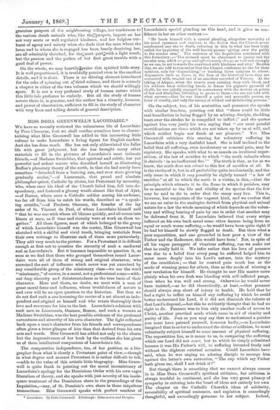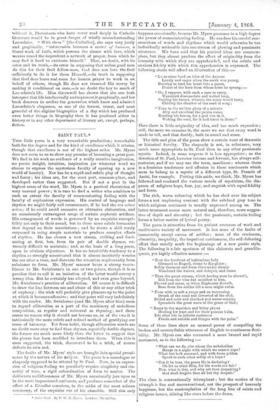MISS DORA GREENWELL'S LACORDAIRE.* WE have so recently reviewed the
voluminous life of Lacordaire by Pere Chocarne, that we shall confine ourselves here to charac- terizing what Miss Greenwell has added in this interesting little volume to make Lacordaire a living figure for English readers. And she has done much. She has not only abbreviated the fuller life with great judgment, but she has brought many other materials to fill in the pictures of Lacordaire's most intimate friends,—of Madame Swetchine, that spiritual and subtle, but yet powerful and ardent nature who described herself as illustrating Buffon's planetary theory of the earth, in that sbe had surely been sometime "detached from a burning sun, and ever since growing gradually cooler,"—of Lamennais, that proud and absolute philosopher-priest, Catholic by choice, but Protestant by necessity, who, when once his ideal of the Church failed him, fell into de- spondency, and fostered a gloomy wrath almost like that of Ajax, —of Beason, whom once a Catholic soldier among his audience, too far off from him to catch his words, described as " a speak- ing crucifix,"—of Frederic Ozanam, the founder of the lay order of St. Vincent de Paul, of whom Lacordaire himself said " that he was one with whom all blooms quickly, and all comes into bloom at once, as if time and eternity were at work on them to- gether." All these figures, most of which belonged to the group of which Lacordaire himself was the centre, Miss Greenwell has sketched with a skilful and vivid touch, bringing materials from their own writings to illustrate each of them more particularly. They add very much to the picture. For a Protestant it is difficult enough at first not to question the sincerity of such a mediaeval zeal as Lacordaire's. But it becomes impossible to question it, so soon as we find that those who grouped themselves round Lacor- daire were all of them of strong and original character, who exercised the sort of influence which never was yet exercised by any considerable group of the missionary class—we use the word "missionary," of course, in a moral, not a professional sense—with- out deep sincerity and disinterestedness as the true basis of their character. Here and there, no doubt, we meet with a man of great moral force and influence, whose truthfulness of nature is and ever will be an open question to the historian. But then we do not find such a one becoming the centre of a set almost as inde- pendent and original as himself and who retain thoroughly their love and reverence for him to the last. Lacordaire's relations with such men as Lamennais, Ozanam, Beason, and such a woman as Madame Swetchine, was the best possible evidence of the profound earnestness and sincerity of his own character. The light reflected back upon a man's character from his friends and correspondence often gives a truer glimpse of him than that derived from his own acts and words. Miss Greenwell has added not only to the charm but the impressiveness of her book by the outlines she has given us of these intellectual companions of Lacordaire's life.
The comparative independence, too, of her position as a bio- grapher from what is clearly a Protestant point of view,—though in what degree and manner Protestant it is rather difficult to tell, —adds to the value of this artistic little biography. Miss Green- well is quite frank in pointing out the moral inconsistency of Lacordaire's apology for the Dominican Order with his own eager liberalism of theory, and she speaks with just severity of his inade- quate treatment of the Dominican share in the proceedings of the Inquisition,—nay, of St. Dominic's own share in those iniquitous transactions. Miss Greenwell speaks with perfect candour of
* Lacordaire. By Dora Greenwell. Edinburgh: Edmonston and Douglas.
Lacordaire's special pleading on this head, and it gives us con- fidence in her on other matters :—
" He lends himself with a special pleading, altogether unworthy of his usual openness and candour, to the fiction that the Church never condemned any one to death, referring in this to what has been truly called the hypocrisy of the well known phrase giving over the guilty to the secular arm.' The sentence of the Inquisition concluded with this formulary The accused must be abandoned to justice and the secular arm, which we pray and qffectionately charge, as well and strongly as we can, to act towards the convicted with kindness and pity.' Besides this, we are told to remember that the Church condemns no one for their opinions, only for 'dogmatizing,' or teaching those opinions to others. Arguments such as these, in the face of the historical facts they are connected with, remind one of an anecdote recorded of Timour. At the- taking of Aleppo, when the streets were running deep with blood, and his soldiers busy collecting heads to frame his gigantic pyramid of skulls, he was quietly engaged in controversy with the doctors on points of law and discipline, labouring to prove to them—wo are not told with what success—that he was himself a quiet and peaceable person, no lover of cruelty, and only the enemy of wicked and unbelieving persons."- On the subject, too, of his austerities and penances she speaks with similar freedom, pointing out that "there could be little real humiliation in being flogged by an adoring disciple, shedding tears over the strokes he is compelled to inflict ;" and she quotes against him very justly his own saying that " our most painful mortifications are those which are not taken up by us at will, and which neither begin nor finish at our pleasure." Yet Miss Greenwell criticizes this craving for voluntary suffering in Lacordaire with a very doubtful hand. She is half inclined to the belief that all suffering, even involuntary or unmoral pain, may be expiatory. She speaks, with what to us sounds an irrational super- stition, of the law of sacrifice to which " the moth submits when. it shrivels in no ineffectual fire.' " The truth is that, as far as we know, the moth does not submit to this law of sacrifice at all. It is the victim of it, but in all probability quite involuntarily, and the only sense in which it may possibly be rightly termed " a law of sacrifice " at all to which the moth is a victim, is this,—that the principle which attracts it to the flame in which it perishes, may be so essential to the life and vitality of its species that the few may be said to die in order that the many may live. This is,. however, but conjecture of the vaguest kind, and we confess that we see no value in the analogies derived from physical and animal nature for a law the whole meaning of which depends on the volun- tary and willing bearing of pain by one in order that another may be delivered from it. If Lacordaire believed that every stripe inflicted on his own back saved some other human being from an equal or much worse suffering,—be would have been quite right if he had let himself be slowly flogged to death. But then what a poor superstition, and one grounded in how poor a view of the Father and the Redeemer, this would have been ! Nor, in spite of all his vague panegyric of vicarious suffering, can we make out that he really held it. We infer rather that his love of penance was due to a belief that every pang he suffered helped him to enter more deeply into his Lord's nature, into the mystery of the crucifixion ; — that he courted pain much less as the mode of winning peace for others, than as the mode of winning a new revelation for himself. He thought he saw His master more plainly when his own flesh was bleeding with self-inflicted pangs, than when he was well and strong. Otherwise he would never- have insisted,—as he did theoretically, at least,—that penance should always stop short of injury to health. He held that he had a right to inflict on himself any suffering by which he could better understand his Lord, if it did not diminish the talents at that Lord's disposal,—but this he evidently thought that he had no right to do. Penance was to him only another mode of access to Christ, another practical mode which came in aid of charity and purity of life. Just as you may say that to understand a painter you must have painted yourself, however badly,—so Lacordaire imagined that in order to understand the divine crucifixion, he must voluntarily subject himself to some amount of physical suffering. The superstition lies, as it seems to us, in comparing the suffering- which our Lord did not court, but to which he simply submitted because it was His Father's will, to suffering invented freely and without the slightest external occasion. Could Lacordaire have said, when be was urging an adoring disciple to scourge him- against the latter's own entreaties, " The cup which my Father hath given me, shall I not drink it?"
But though there is something that we cannot always concur in in Miss Dora Greenwell's spiritual criticism, her criticism is always truthful in sentiment, and she has very great pliancy of sympathy in entering into the heart of ideas not entirely her own The chapter on the Catholic Church's ideas of solidarity, reversibility of spiritual sentences, and expiation is exceedingly thoughtful, and exceedingly germane to her subject. Indeed,
without it, Protestants who have never read deeply iu Catholic literature would be in great danger of wholly misunderstanding Lacordaire. " With them " [the Catholics], she says very justly and graphically, "intercession becomes a matter of business, a literal work of faith, which pursues the sinner with love, which weaves round the impenitent a network of prayer, from which he may find it hard to extricate himself." That., na doubt, with its error and its truth,—its error in supposing that unless good men do this for their frail fellow-men, God does not love the frail sufficiently to do it for them Himself,—its truth in supposing that God does leave real room for human prayer to work in on behalf of others, though He does not trammel His mercy by making it conditional on ours,—is no doubt the key to much of Lacordaire's life. Miss Greenwell has shown that she can both interpret that life intellectually and represent it graphically, and her book deserves to outlive the generation which knew and admired Lacordaire's eloquence, as one of the tersest, truest, and most graceful of the slighter biographies of a day which has produced even better things in biography than it has produced either in history or in any other department of literary art, except, perhaps, fiction.









































 Previous page
Previous page